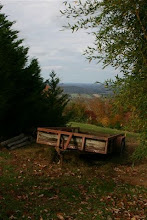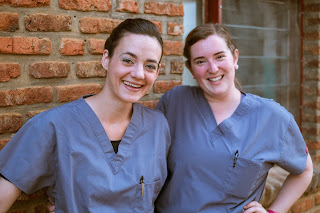Easter at Kibogora brought a new experience to the group as we traveled for the first time on Lake Kivu in route to a rural Free Methodist Church for Easter services there. We boarded a local homemade vessel and set out for a nearby peninsula, changing a long walk into a 20 minute boat ride with spectacular scenery. The boat had a gasoline powered motor which died within a couple of hundred yards of our destination, leaving us adrift on the placid lake for a few minutes as the owner tinkered with the motor.
Thankfully the motor restarted and we puttered on in to shore in time for church. The pastor from Kibogora led us in a brief hymn of thanks as we docked--I was struck by his practice of gratitude for a small success--how often do I thank God for arriving home for work each day?
To board the boat we hiked down a mile long mountain path to the lake and had a shorter walk up to the rural church that sat atop the ridge of the peninsula. The brick church had walls and a roof but, like many of the churches in Rwanda, had windows without glass, doorways but no doors, and red dirt floors.
The service began at 9. There was much singing, both congregationally and by choirs. Members of our group were seated in specially prepared seats behind the pulpit (a wooden desk covered in a sheet and decorated with colorful banners.) Our seats were a wooden bench covered in green cloth. The sun shining through the colored overhead cloth cast a strange pastel glow on the pulpit area.
Almost all of the singing was accompanied by dancing, some choreographed in the various choir performances , but joyful dancing occurred during the congregational hymns as well, and many of our group joined in, much to the delight of the children.
The service lasted over four hours and included a new member ceremony, a baby dedication ritual, a brief homily by one pastor, a longer sermon by the senior pastor, and, at the end, communion.
Afterwards we were ushered to a classroom in the school next door and given a lunch of goat meat, goat liver, beans, rice and gravy, and soft drinks. Meat here is scarce with many families only having it on major holidays so the meal was a real gift to us from the local church.
Afterwards we slipped and walked down the steep red dirt embankment to our boat and returned to Kibogora. We got our exercise for the day by climbing from the boat landing back up to the housing compound, a walk of about a mile with a 1000 foot change in elevation.
The week at the hospital was the busiest and most tragic of either year here. Monday Hope, the seven month old with unresolved respiratory distress continued to do poorly and a staff meeting resulted in a decision to send her to the children's hospital in Kigali. She arrived without incident on Tuesday and is being evaluated there. Tuesday began normally with rounds in the NICU and then the pediatric building. Around 11 o'clock we received a request to attend a term c/section, so Jamie Partain, a trained neonatal nurse practitioner and Katy Lalor, soon to be a pediatric neurology resident, volunteered to go while we continued to help see the 40 or so peds patients.
Shortly I received an urgent call from Katy asking for assistance with the undiagnosed preterm triplet delivery that the term c/section had become. We (Micki, Mary Margaret Clapp, soon to be a family medicine resident, and I) climbed the two ramps leading from the peds ward two levels up the hill to the OB resusitation area. The triplets weighed 1 kg, 1.15 kg, and 1.47kg and all three had respiratory distress. We transferred them to the NICU and added the support available but the two largest died of respiratory failure within hours, leaving only Sunshine (our name for her since mothers refuse to give names to their newborns for the first few weeks in Rwanda) to struggle for survival.
Wednesday night about 10:25 we were called to the NICU for twins weighing 1500 grams each plus a baby weighing 1600+ grams whose bowel was outside the abdomen (called gastroschisis). The twins had mild respiratory distress and were quickly situated with oxygen cannulas and placed in incubators. The baby with the gastroschisis presented a decision that is too common here--enter into care that is almost certainly futile but will prolong life for a few hours or a day, or provide palliative care and do nothing else. This infant's problem in the US is very difficult to manage and requires extended ventilator care, so in conjunction with the missionary general surgeon, Dr. Tim Berg, we decided to not pursue anything but comfort care--the infant died Thursday morning in Micki's arms as the mother and grandmother looked on, unwilling to hold the baby.
Thursday morning, we were called to a c/section for a preterm baby. While we were stabilizing that 1640 gm baby, Dr. Ngoy rushed in from the c/section with the twin that they had been surprised to find when trying to evacuate the placenta of the first baby. Baby 2 weighed only 880 grams and had been hiding out!! Both had respiratory distress and were placed on nasal oxygen, but are now off oxygen at this time.
We went to a late lunch, but were called back down for a deterioration in Sunshine (the surviving triplet from Tuesday, who had suddenly become difficult to oxygenate. She never improved and died later that day in Mary Margaret's arms, probably from a brain hemorrhage. Frequently here mothers refuse to see or hold their dying babies, a cultural habit that seems to go hand in hand with their refusal to name them until they have survived for weeks.
The same day, while waiting for another c/section a woman walked in off the road and approached Micki, who was setting up the resuscitation area for the delivery we were attending. The woman patted her abdomen--Micki, not understanding the gesture asked her what was wrong. The woman proceeded to unwrap a 1200 gram little girl from a blanket, apparently having delivered at home or in route. Micki sent someone for me and we evaluated the baby who, though very cold, was in otherwise good shape.
Soon afterwards the OB team delivered a 27 week pregnancy by c/section (weight 900 gm) and we had our 10th premmy in just over 48 hours. We settled that one on nasal cannula cpap and drug ourselves off to the houses for dinner. Ten babies, four deaths--in the US perhaps one death or none--the lack of technology impedes the obviously better nursing and physician care that is evolving here. The lack of ventilator support or surfactant to treat respiratory distress, the lack of IV nutrition, the absence of pumps which can accurately deliver IV volumes, and the lack of routine blood gases and electrolytes make management of all sick neonates more of a guessing art than a scientific endeavor.
Friday Mary Margaret, Micki, and I, along with Julie Yerger, the Free Methodist missionary nurse from Washington, and Esphrosine, the Rwandan charge nurse and our primary English--Kinyarwandan translator, had to tell mom and dad that their three week old who has never fed except by tube, should be taken home so that they could, have time with him before he goes to Heaven. Esphrosine, whose soft heart shows with every new death, struggled to keep her own composure as she translated our words. The parents were sad yet glad to be going home which, though only about 12 miles away, was a 4 hour walk and a 1.5 hour car ride over very poor roads.
The mother of that infant had her money stolen earlier that day. In Africa one has to,pay the bill after discharge or become a boarder at the hospital until the family or the village of origin sends the funds. The entire hospital bill for 18 days was just over $150 USD and after insurance the parents 10 % was about $15, so our group gave the money to the social worker somthatntheyncould go on home.
Though this year has been much busier than last year, we have been blessed to have Julie Yerger here. She is an amazing person of great perseverance and optimism in the face of very difficult circumstances. She is the "go to" person for the nursing staff and has made significant improvements in care since she returned in June, having taken a year furlough after four years here prior to that. Her balanced, realistic approach to the realities of what can be done here have made an otherwise unbearable few days no less sad but easier by far on our team.
Jamie Partain has worked tirelessly while not feeling all that well and is helping Julie review nursing policy to try to improve care while also being a care giver on our team in both the NICU and the peds ward (not her comfort zone). Katy and Mary Margaret have never complained and dove into patient care like seasoned residents, helping to stabilize babies, attend c/sections and do whatever had to be done to provide the best care we can here. Micki has returned to her respiratory care roots, added some nursing care, and is a provider of gifts to moms through her compassion in end of life situations and her provision of knitted caps for all the NICU babies.
On the weekend the "old folks" rested while the nine younger of the group split into either going back for another hike in the rain forest or a boat ride to Kumbya, the missionary retreat nearby. Sunday, April 7, is the day Rwanda marks the beginning of the genocide mourning period so we stayed home for our own church service. Later the pediatric group went up to the house of Dr. Ngoy and his wife to see their seven month old twin girls, Gabriel and Gabriella, who were born here late last August. We had dinner with them and then headed to our compound before the beginning of the evening genocide recognition service.
It was a full week. We leave Wednesday for Kigali and Friday for home.

.JPG)






















